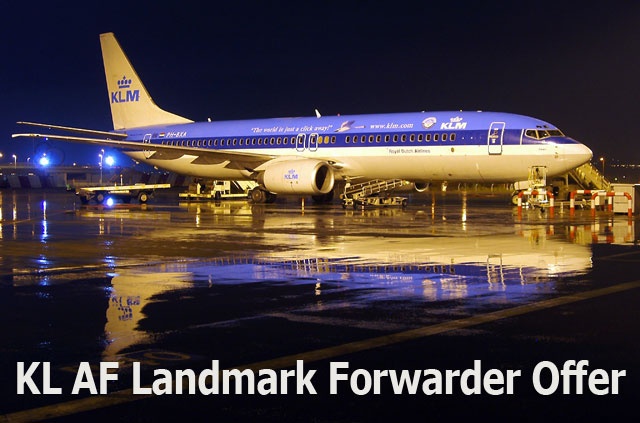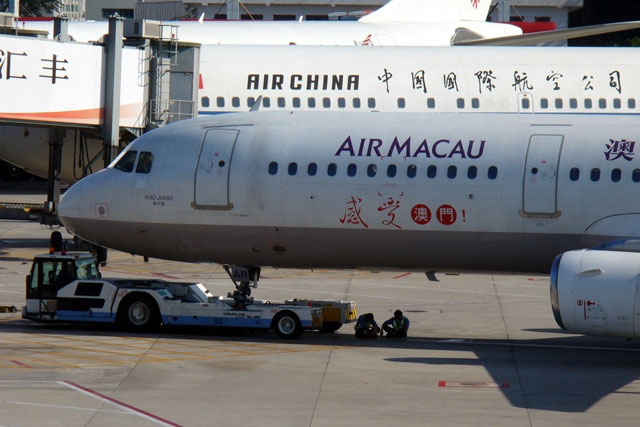|

KLM-Air France Cargo will incorporate controversial
fuel surcharges partly into air freight rates September 1.
Air Cargo News FlyingTypers
has obtained information from sources at a big media pow-wow being held
later today to announce the new deal for cargo in Paris.
"By doing so we wanted to be a forerunner
of the air cargo community," revealed a source of the Dutch/Franco
carrier in an exclusive interview with ACNFT.
"We have been asked by a growing number
of shippers and forwarders to change the current system and bring the
rate and surcharge structure to higher market transparency," the
source stated.
The new model is based on three different
flying distances: long haul, medium and short haul flights.
While the basic parameters for long distance
transport will not be amended, by entirely splitting rates and surcharges
as before, the other flights will see some fundamental changes with parts
of the fuel surcharge integrated in the rate.
According to information obtained by ACNFT,
the new rate structure will be 20 percent for the kerosene surcharge of
presently €1.25 euros on medium haul flights and 50 percent on short
distance routes.
A shipment from Paris to medium haul destination
Beirut illustrates how the new deal will work
On that route KLM /AF Cargo charges an average
rate of €0.50 euros per kilogram, plus €1.25 euros fuel surcharge
adding €0.14 euros for security, making the total rate per kilo €1.89
euros total.
The new rate structure will demand the same
final amount from the clients, but the invoice breakdown will be comprised
of €0.75 euros as rate plus €1.00 euro fuel and €0.14 for
security.
The source said reasoning here is that 20%
of €1.25 euros surcharge accounts for €0.25 euros.
From September 1, this difference of €0.25
euros will be added to the carrier's rate bringing it up to €0.75
euros (0.50 + 0.25) per kilogram instead of 0.50 euros as before.
"By introducing three levels of distance
zones we take into account different fuel burning patterns of our fleet,"
the source said.
"Our new mechanism will therefore,
not lead to a fundamental change but will change the relative proportion
of air freight rate and fuel surcharge.
“The new deal should thrill the forwarders
since they get commissions on the rates, not the surcharges, though.
“This new arrangement allows for forwarder
participation in the entire air cargo revenue stream process.”
Heiner Siegmund
ATC Success Takes Long View
 For
years a tendency in air cargo has been for airlines to either get rid
of their cargo business completely – or to reduce staff to a minimum
and employ a General Sales and Service Agent (GSSA). For
years a tendency in air cargo has been for airlines to either get rid
of their cargo business completely – or to reduce staff to a minimum
and employ a General Sales and Service Agent (GSSA).
Actually today in 2008 only a handful of
carriers dedicate their own staff and facilities to cargo.
But as cargo continues to grow in importance
against runaway fuel and security costs almost everywhere else, this view
may change.
What most of air cargo already knows is
that matching the production cost of moving the goods versus net income
has made service agents winners as well.
Ingo Zimmer, Chief Operating Officer ATC
Aviation Services is among an elite breed of GSSA’s seem to be able
to think local and act globally at the same time.
Based in Frankfurt, Ingo says one aspect
of ATC’s success has been to offer some or all of the services on
his GSSA menu as key to unlocking new opportunities all around.
“Our group offers any combination
of options to airlines including just sales in Austria and that’s
it, or all European coverage including service disciplines such as ground
handling supervision, road feeder services etc.
“In fact our portfolio (www.atc-aviation.com)
is testimony that carriers from all over the world find utilizing our
services in any number of varieties makes good sense.
“But all of our service partners have
one basic priority in common; to realize the highest possible contribution
from carrying cargo – and the least possible headache.”
While most mention that favorite four-letter
word, fuel when the subject of challenges comes up today, Mr. Zimmer also
says that rising fees and handling charges at major airports are always
a critical component of concern along with fuel.
“We can always create a package as
part of our agreements offering carriers some refuge and one less thing
to worry about.
“ATC is, in reality a company that
has emerged in the service quarter serving up a mix of airlines, long
haul and short haul.
“We note, all of our carriers are
remarkably more cost-conscious than they were, say a year ago.
“In 2008, every single all cargo flight
is carefully scrutinized.
“That means that in almost every case,
freighters and even companies that are less efficient are disappearing.”
We wonder how ATC Aviation Services that
represents airlines from different continents understands what is going
on in each of the trade lanes it serves?
“At ATC, five service teams apply
their knowledge and market know how to supply specialized expertise across
our five main markets.
“Our global results from this approach
have proven to be much more rewarding all around especially as compared
to a ‘one size fits all,’ or everyone must conduct business
by our set of rules approach.
“ATC people who specialize in Russia
and Central Asia for example combine thorough market knowledge of the
airlines serving these markets and local obstacles with a working understanding
of local language.
“Our approach is simple, but a major
benefit for ATC customers.
“I learned a long time ago as a cargo
agent, that basic to the business of serving and keeping customers is
hands on local knowledge and total communication between the parties all
around.
“Everybody needs to know what to expect
every step of the way.
As example, ATC moves consignments from
Vatry in France into destinations in Africa.
“Believe me, you got to have both
hardball knowledge and support but also a feeling of how things work in
shipping cargo to Africa.
“Our people know it.
“It is this geographical dedication
I think that makes us a leader in the market.”
Today ATC operates from 19 offices for more
than fifty carriers in Germany, Switzerland, Spain, Belgium, Netherlands,
Australia, France and India.
It’s worth mentioning that the India
package includes GSSA activities in New Delhi, Mumbai, Bangalore and Chennai.
ATC’s roots date back to the early
seventies when ATC Air Transport Consultants Ltd. was established in Switzerland
as a charter broker.
ATC was founded in 1979 is a pioneer in
the field of cargo GSA for scheduled carriers, a concept which was then
introduced successfully in other European countries.
In fact during the 1980's ATC Group was
the first GSA organization to provide coverage with dedicated offices
across several European countries.
In 1995 ATC was taken over by key management
and ATC Aviation Services Ltd. was born. New strategies were introduced
based on the corporate slogan: ATC Always Takes Care.
In 2004 ATC Aviation Services Ltd became
a member of the World Freight Company Group – creating a worldwide
network of GSSAs.
Last year (2007) Amsterdam and Brussels
became full members of the ATC Aviation Group in the Benelux
This year (2008) EC Cargo Barcelona and
Madrid joined the ATC Aviation Group as full members in Spain.
In total ATC company revenue for the year
is forecast at €150million.
Ingo Zimmer took the classic German apprenticeship
as a freight forwarder at Danzas GmbH.
He joined Swiss ATC and later guided Germany
to top position in the group.
Today at 45, Ingo Zimmer has risen to his
current position as one of two company directors, but he remains a hands-on
customer centric individual, available and ready for business around the
clock based in Frankfurt.
Ingo is a dynamic leader alright but also
a caring father for a very international family.
“The most important aspect of our
service as mentioned, is our people.
“Certainly ATC brings the full menu
with all the bells and whistles to the table offering complete end to
end capability in all the IT and specific to air cargo disciplines to
get the job done.
“But our growth into new markets and
continued success is driven by our employees.
“ATC will be as big as it wants to
be but along the way we will never lose touch with our customers who drive
everything we do.” zimmer@atc-aviation.com
Guenter Mosler
Hanging
On To Dear Life

Just in the first half of this year, losses
from the soaring oil prices have eaten Air Macau 200 million Patacas (USD
24.9 Million), half of the airlines’ total capital, making the company
on the edge of bankruptcy.
As the flag carrier of Macau SAR, the airline
earns more than 70% of its revenue from transporting passengers across
the Taiwan Strait to Macau.
And for 14 years since its foundation in
1994, it has expanded from one aircraft to the current 15 without asking
any capital inflows from its shareholders.
However, like many other small and medium
airlines in China, Air Macau is more fragile than its larger competitors
in the face of the ever rising oil prices.
On Wednesday (July 9), Zhao Xiaohang, Chairman
of Air Macau, sent out a letter to the company's shareholders, announcing
that "since April 30, 2008 the net worth of the company had fallen
below half of the value of the company's capital," leaving the company
in the situation described in Article 206 of the Macau Commercial Code.”
Read an airline in very deep trouble into
that.
According to Article 206, if a company loses
up to half of its capital, the body must propose to be dissolved or the
capital reduced – unless shareholders put up cash to replenish the
assets equal to the value of the company capital.
Expectation of the market to the attitude
of Air Macau’s controlling shareholder, Air China, has been quite
positive these days, believing that Air China will give its hand.
With little surprise, in a statement sent
to Air Cargo News FlyingTypers on July 10, Air Macau said the company
is "very pleased to announce that our major shareholder – Air
China International – as well as the Civil Aviation Authority of
China have committed their support to Air Macau to ensure that Air Macau
will be sustained through this critical period."
Also, the company said that it is planning
"major strategic moves,” promising “an announcement very
shortly."
David
|



